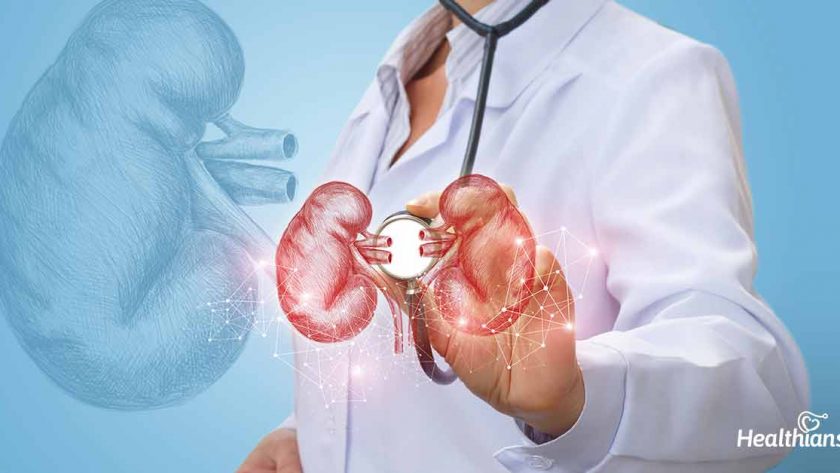[ad_1]
Contributed by: Priyaish Srivastava
Introduction
The kidneys are two bean-shaped organs, located just below and behind the belly on each side of the spine. The kidneys are about the size of a fist, which is roughly four or five inches long. A healthy kidney can filter approximately half a cup of blood per minute to remove waste and extra fluid from the body through urine.
The process of urine production involves very complex steps of removal and reabsorption, which helps in maintaining a healthy and balanced level of body chemicals. Your kidneys also aid in the removal of acid content produced by your cells and help in maintaining a balance in the levels of water, salts, and minerals like sodium, potassium, calcium, and phosphorus in the blood. This balance is extremely crucial for the healthy functioning of your body.
Your kidneys produce hormones that aid in:
-
- Managing the blood pressure
- Increasing red blood cells (RBCs) production
- Maintaining calcium metabolism
Your kidneys perform several additional functions that aid in your overall well-being. Some of these functions include:
-
- Helps in the removal of waste products and excess fluid through urination
- Removal of drugs and their byproducts
- Balance the levels of bodily fluids
- Aids in the production of vitamin D to promote bone health
As you continue to read this article, we will discuss the causes of kidney complications, their symptoms, and lifestyle changes you can adopt to promote kidney health.
Causes of kidney complications:
Some illnesses and medical conditions that can damage your kidneys and lead to kidney diseases include:
Diabetes is a condition in which the production of insulin is compromised, thus increasing your blood sugar levels. The high sugar levels in the blood, clog the blood vessels in your kidneys and obstruct their functioning.
Also known as high blood pressure, it is the second leading cause of kidney failure and can give rise to other complications like stroke and heart attack. The kidneys use blood vessels to filter wastes and extra fluids from the body. Hypertension damages the blood vessels and obstructs the supply of oxygen and other essential nutrients to kidneys, which impacts their functioning.
The presence of stones in the kidneys is very common and it causes severe pain in the side and back of the body. It can occur due to factors like calcium buildup, urinary tract infection, or any other obstructions. In some cases, the condition can be prevented with medications and diet. If the stone is too large to pass, treatments can help remove the stone or break it into tiny pieces that can pass through urine.
When germs enter the urinary tract and give rise to symptoms like pain, burning sensation, or frequent urge to urinate, it can lead to bladder infections. These germs can also travel to your kidneys via the bloodstream and can cause kidney damage.
Consuming large amounts of over-the-counter medicines like painkillers can harm your kidneys. Substance abuse/addiction such as smoking, excessive alcohol intake, and illicit drugs, also increases the risk of kidney failure.
Symptoms of kidney complications
Usually, if you have kidney problems your body can manifest some symptoms, but in some cases, there might be none. Some of the common symptoms include:
-
- Less urination
- Swelling of legs, ankles, and feet
- Unexplained shortness of breath
- Excessive tiredness and drowsiness
- Nausea
- Problem concentrating and confusion
- A feeling of pain or pressure in your chest
- Seizures
Lifestyle changes to promote kidney health:
Changing your unhealthy lifestyle to a healthy one is always the best way to prevent yourself from various health complications. Here are some of the best changes you can implement to promote the health of your kidneys:
Diabetes is one of the most common causes of kidney ailments. Managing your diabetes can reduce the risk of kidney complications and help you live a healthy life. Here are some tips that can help you manage diabetes:
-
- Stop consuming food items that carry added sugar
- Quit alcohol and smoking
- Consume healthier fats
- Eat less salt
- Do not skip your medication
- Do regular exercises
- Lower your blood pressure:
High blood pressure or hypertension can lead to kidney failure by damaging the blood vessels in the kidneys and obstructing the organ’s ability to remove excess fluid and wastes. By managing your blood pressure, you not only reduce the risk of kidney complications but also the risk of heart ailments. Here are some tips that can help manage your blood pressure:
-
- Exercising regularly
- Losing weight
- Quitting alcohol and smoking
- Eating green vegetables, nuts, healthy fats, fish, and olive oil
- Reducing stress
Consuming a healthy diet is very important for people who have been diagnosed with kidney ailments. Here is a list of the best foods you can consume to promote the health of your kidneys:
-
- Cauliflower
- Blueberries
- Egg whites
- Garlic
- Buckwheat (kuttu)
- Olive oil
- Cabbage
- Bell peppers
- Onions
- Pineapple
Final thoughts
Kidneys are one of the most important organs in your body which helps in the removal of toxic substances and excess fluid through urination. Some existing health issues like diabetes or hypertension can negatively influence the health of your kidneys and lead to kidney failure. The best way to manage the condition is by implementing healthy lifestyle changes, getting an early diagnosis, and seeking medical attention. This will help in improving the condition of your kidneys, allowing you to live a healthier and longer life.
Get Your Kidneys Checked Today!
This post has already been read 2 times!
[ad_2]
Source link




